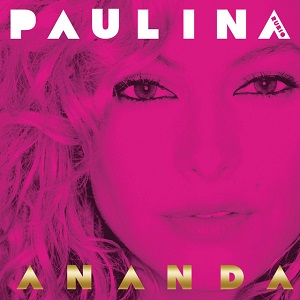
Paulina Susana Rubio Dosamantes is a Mexican singer, songwriter and television personality. Referred to as "The Golden Girl" and "Queen of Latin Pop", she first achieved recognition as a member of the successful pop group Timbiriche from 1982 through 1991. After leaving Timbiriche, she embarked on a solo career. Rubio has sold over 15 million records, making her one of the best-selling Latin music artists of all time.

Ananda is the eighth studio album by Mexican singer-songwriter Paulina Rubio, released on September 18, 2006, through Universal Latino. Its pop rock music incorporates latin, dance, folk, electropop, alternative and flamenco styles with instrumentation from synthpop beats, guitars, drums, synthesizers, strings and Spanish musical instruments. Its themes range from love, empowerment, and dancing. Contributions to the album's production came from a wide range of producers, including Cachorro López, Rick Wake, Tricky Stewart, Áureo Baqueiro, TOY Hernández and Gustavo Santaolalla. Among the songwriters and artist collaborators appear on the album are Xabi San Martín from La Oreja de Van Gogh, Slash from Guns N' Roses, Juanes, Julieta Venegas and Coti.

"Ni Una Sola Palabra" is a song by Mexican singer Paulina Rubio from her eighth studio album Ananda (2006). It was released on July 23, 2006, by Universal Latino, as the lead single from the album. The song was written by Xabi San Martín, keyboardist of the Spanish pop band La Oreja de Van Gogh, and was intended to be included in one of the band's albums. Rubio took an interest in the song and recorded it in 2005 at her home studio in Miami, and it was produced by Cachorro López. Musically, "Ni Una Sola Palabra" is a pop rock song with elements from synth-pop, new wave and electronic.

Pau-Latina is the seventh studio album by Mexican singer Paulina Rubio, released on February 10, 2004, by Universal Latino. Musically, Rubio wanted to make a "futuristic folk" or a "cocktail of different music genres", thus incorporating eclectic latin music in its sound with instrumentation from techno beats, guitars, drums, synthesizers, strings and Spanish guitars musical instruments. Its themes range from love, dancing, friendship and feminist. Contributions to the album's production came from a wide range of producers, including Emilio Estefan, Chris Rodríguez, Toy Hernández, Marcello Acevedo and Sergio George.

Border Girl is the sixth studio album and first English-language album by Mexican recording singer Paulina Rubio. It was released on 18 June 2002 internationally by Universal Records and later launched in the Japan on August 21, 2002 by Umvd Labels. To her crossover into the English-language pop market, Rubio worked with writers and producers such as Kenny Flav, Lenio Purry, Doug Morris, Gen Rubin, Richard Marx, Brett James, Troy Verges, Michelle Bell, Jodi Marr and works again with Estefano, Chris Rodríguez and Marcello Acevedo. Its music incorporates genres of pop with influences of dance and pop rock, dived into elements of R&B, disco, ranchera, hip hop, house, and electronica. Its lyrics address the subjects of love, sexuality and self empowerment.

Paulina is the fifth studio album by Mexican singer Paulina Rubio. It was released on May 23, 2000 internationally by Universal Music México, being the first one with the label after departing from EMI México. Rubio worked with writers and producers such as Estéfano (mostly), Chris Rodríguez, Armando Manzanero, Juan Gabriel, Christian De Walden, and Richard Daniel Roman. The album explores a more variety sounds much different to the vein of her albums with EMI Music, and has an overall latin pop and dance-pop vibe, with influences from rock, ranchera, bolero, funk and house. Elaborating a "synthesis of the end of the millennium" theme for the album, Rubio reinvented her image.

Mexican singer-songwriter Paulina Rubio has released eleven studio albums, fifteen compilation albums, 65 singles, ten promotional singles, and has made some eleven guest appearances. In 1992, Rubio signed a recording contract with record label Capitol Latin in order to launch her career as a solo artist, after recording ten albums with Timbiriche between 1982 and 1990.

"Don't Say Goodbye" is a song by Mexican singer Paulina Rubio, taken from her sixth studio album and crossover album, Border Girl (2002). It was written by Joshua "Gen" Rubin and Cheryl Yie and produced by Rubin. "Don't Say Goodbye" is a dance-pop song and talks about rejecting the idea of not saying goodbye to a lover. The song was released through Universal Records on 29 April 2002 as the lead single from the album. In Latin America and France, a Spanish version of the song titled "Si Tú Te Vas" was released, written by Luis Gómez Escolar.

"Te Quise Tanto" is a song by Mexican singer Paulina Rubio from her seventh studio album Pau-Latina (2004). It was released as the lead single from the album by Universal Latino on December 22, 2003. The song was written by Coti Sorokin, Andahí and Adrian Schinoff, and produced by Emilio Estefan Jr.. "The Quise Tanto" is a Latin pop and pop rock song in which Rubio expresses how difficult it is to forget a lover.

"The One You Love" is a song by Mexican singer Paulina Rubio from her sixth studio album, Border Girl (2002). It was written by Brett James and Troy Verges, and produced by Shep Goodman and Kenny Gioia. The song was released as the third US and second international single from Border Girl on August 20, 2002, by Universal Records. A Spanish version titled "Todo Mi Amor", was also recorded and released to the Latin American market.

"Algo Tienes" is a song recorded by Mexican singer Paulina Rubio for her seventh studio album, Pau-Latina (2004). Written and produced by Chris Rodríguez and Manny Benito, it is a pop and dance track containing a catchy "Pau! Pau!" hook. The song was released by Universal Latino as the second single from the album on May 17, 2004.

"Y Yo Sigo Aquí" is a song recorded by Mexican singer Paulina Rubio for her fifth studio album, Paulina (2000). It was released as the third single from the album on November 13, 2000. Also, it was released in January 2001 in the United States and Europe. Jointly written and composed by Estéfano, "Y Yo Sigo Aquí" is a dance pop and Europop song along pulses with a synthesized house and techno beat. It was one of the most successful songs of the year in the world and is recognized as one of Rubio's signature songs.

Gran City Pop is the ninth studio album by Mexican singer Paulina Rubio, released by Universal Latino on June 23, 2009. The pop album expanded the Rubio's stylistic palette by combining elements of genres such as rock, ranchera, hip-hop, eurodisco or arena rock, and she became more involved in songwriting and creative elaboration, extracting influences from various dance-pop-based genres including electropop, synth-pop and eighties British pop.

"Causa y Efecto" is a song performed by Mexican singer Paulina Rubio. The song was recorded for her ninth studio album Gran City Pop, and was released as the lead single on March 26, 2009. Causa y Efecto became a hit reaching number 1 in the U.S. Billboard Hot Latin Songs and Hot Latin Airplays. Causa y Efecto was produced by Cachorro López and written by Mario Domm and Mónica Vélez. "Causa y Efecto" is Rubio's first number one single in the Billboard Hot Latin Songs since Ni Una Sola Palabra in 2006. "Causa y Efecto" was awarded "Song of the year pop/ballad" by ASCAP.

"Ni Rosas Ni Juguetes" is a song recorded by Mexican recording artist Paulina Rubio for her ninth studio album Gran City Pop (2009). It was written by Claudia Brant, Noel Schajris and Gianmarco Zignago, and produced by Cachorro López. Due to popularity, the song was announced as the second single on July 20, 2009, released official worldwide on August 17, 2009 by Universal Music Latin Entertainment. "Ni Rosas Ni Juguetes" is a Latin pop song with ranchera and hip-hop influences. The song's lyrics discusses Rubio's decision to overcome a relationship and her empowerment.

"El Último Adiós" is a song recorded by Mexican singer Paulina Rubio for her fifth studio album Paulina (2000). It was released as the second single from the album on July 17, 2000 by Universal Latino. Rubio co-wrote and co-produced the track with Estéfano, and was originally conceived it as a ranchera-hip-hop-styled song. Lyrically, its a break-up mood.

"Me Gustas Tanto" is a song recorded by Mexican singer Paulina Rubio for her tenth studio album, Brava! (2011). It was released by Universal Latino as the lead single from the album on September 2, 2011. The track was written by Rubio, Nacho and Andrés Recio, whilst production was handled by RedOne.

Brava! (Brave!) is the tenth studio album and second bilingual album by Mexican recording artist Paulina Rubio, released on November 15, 2011 by Universal Music Latino. Two of its three singles "Me Gustas Tanto" and "Boys Will Be Boys" became hits for Rubio.

"Boys Will Be Boys" is a song recorded by Mexican recording artist Paulina Rubio. It was released as a lead single from the Brava!s reissues (Brava! Reload and Bravísima!) on March 24, 2012, by Universal Music, and distributed in both physical and digital formats. The track was written by Nadir Khayat, Alex Papaconstantinou, Bilal Hajji, Adam Baptiste, whilst production was handled by Khayat and Rubio. Its Rubio's first single in English-language since 2002. In 2013 it was included as part of the compilation album Pau Factor.

Deseo (Desire) is the eleventh studio album by Mexican recording artist Paulina Rubio, released on September 14, 2018 through Universal Music Spain, seven years after its predecessor Brava! (2011). Rubio worked with a multitude of producers and artist on the album, including Mauricio Rengifo, Andrés Torres, Juan Magán, The Julca Brothers, Toy "Selectah" Hernández, Morat, Joey Montana, Nacho, Xabier San Martin from La Oreja de Van Gogh, Alexis & Fido and DCS. It is a pop album characterized by Latin rhythms abound with urban sounds, and lyrical themes of love and female empowerment.

















